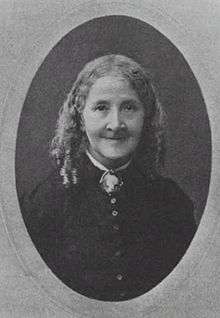Elizabeth Clarke Wolstenholme Elmy

Elizabeth Clarke Wolstenholme Elmy (1833–1918) was an English suffragist, essayist and poet, who also wrote under the pseudonyms E, Ellis, Ellis Ethelmer, and Ignota.
Life
Elizabeth Wolstenholme was born in Cheetham Hill, Manchester and baptised on 15 December 1833 in Eccles, Lancashire where her father was a Methodist minister.[1] She was the daughter of Revd Joseph Wolstenholme who died around 1843. Her mother Elizabeth had died when she was very young and she was brought up by her stepmother Mary (née Lord).[2] She attended Fulneck Moravian School for two years but was not permitted to study further. Her brother Joseph Wolstenholme (1829–1891) became a professor of mathematics. She opened a private girls' boarding school in Boothstown near Worsley and stayed there until 1865 when she moved her establishment to Congleton in Cheshire. In 1865 she founded the Manchester Schoolmistresses Association.[1]
In the 1870s Wolstenholme joined the National Secular Society and began a relationship with one of its vice presidents, Ben Elmy, whom she married shortly before the birth of their son Frank in 1874. Elmy had also been a school teacher but subsequently ran a mill producing silk cloth.[2] In the UK census she is listed as "Elizabeth Woolstencroft" living with Benjamin Elmy.
Campaigning
Wolstenholme became an ardent feminist and vigorous campaigner for women's suffrage. She, along with fellow suffragist Josephine Butler, became secretary to the Married Women's Property Committee from 1867 until 1882, when the organisation was disbanded following their successful campaign to introduce the Married Women's Property Act 1882. Wolstenholme was also honorary secretary of the Manchester Society for Women's Suffrage in 1865, a founding member (with Harriet McIlquham and Alice Cliff Scatcherd) of the Women's Franchise League in 1889[3] and the founder of the Women's Emancipation Union in 1891.
Works
She published a long feminist poem, Woman Free in 1893; two sex education manuals (The Human Flower, 1894, and Baby Buds, 1895) and many pamphlets, including her last work, Woman's Franchise: The Need of the Hour in 1907. Baby Buds, published under the pseudonym Ellis Ethelmer, was 47 pages sex manual disguised as a botanical textbook for children:[4]
"[A]re the male flowers of a vegetable marrow plant needless, or do they lead a useless life; seeing that they bear no fruit?’"
References
Notes
- 1 2 Crawford (2003), p. 225
- 1 2 Stanley Holton, Sandra (2004), "Elmy, Elizabeth Clarke Wolstenholme (1833–1918), campaigner for women's rights", Oxford Dictionary of National Biography (online ed.), Oxford University Press, retrieved 26 February 2015 (subscription required)
- ↑ Stanley Holton, Suffrage Days: Stories from the Women's Suffrage Movement (Routledge 2002): 76. ISBN 9781134837878
- ↑ McNeal, Laila. "The Early Feminist Who Used Botany to Teach Kids About Sex". The Atlantic. Retrieved 2016-10-07.
Bibliography
- Crawford, Elizabeth (2003), The Women's Suffrage Movement: A Reference Guide 1866-1928, Routledge, ISBN 1-135-43402-6